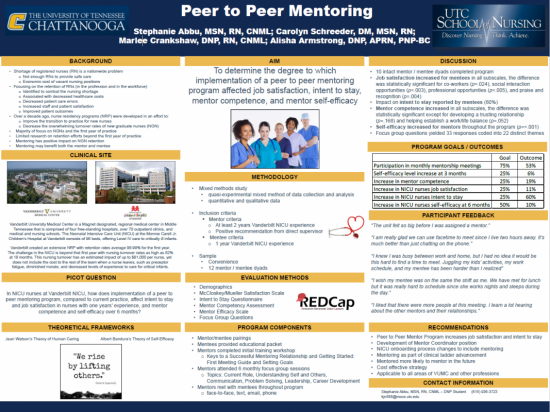
Spotlight: Stephanie Abbu, DNP, RN, CNM
Clinical Business Coordinator, Neonatal Services
Monroe Carell Jr. Children's Hospital at Vanderbilt
Type of project: Research
Title of project: Peer to Peer Mentoring
Co-authors involved in this publication: Carolyn Schreeder, DM, MSN, RN; Marlee Crankshaw, DNP, RN, CNML; Alisha Armstrong, DNP, ARPN, PNP-BC
Description of project: To determine the degree to which implementation of a peer-to-peer mentoring program affected job satisfaction, intent to stay, mentor competence, and mentor self-efficacy.
Why you chose this project: Shortage of registered nurses (RN) is a nationwide problem. There are not enough RNs to provide safe care. Vanderbilt created an extensive NRP with retention rates average 98-99% for the first year. The challenge in the NICU is beyond that first year with nursing turnover rates as high as 62% at 18 months. This nursing turnover has an estimated impact of up to $81,000 per nurse, yet does not include the cost the rest of the team when a nurse leaves, such as preceptor fatigue diminished morale, and decreased levels of experience to care for critical infants.
Notes from the spotlight: Peer to peer mentoring improved job satisfaction and intent to stay in the NICU. Job satisfaction and intent to stay in the NICU. Job satisfaction increased for mentees in all subscales, the difference was statistically significant for co-workers (p=.024), social interaction opportunities (p=.003), professional opportunities (p=.005), and praise and recognition (p=.004). Impact on intent to stay was reported by 60% of mentees. Mentor competence increased in all subscales, the difference was statistically significant except for developing a trusting relationship (p=.168) and helping establish a work/life balance (p=.052). Self-efficacy increased for mentors throughout the program (p=<.001). Focus group questions yielded 33 responses coded into 22 distinct themes. With a cost of $5,500, the P2P mentoring program is a cost effective strategy to increase nurses’ job satisfaction and intent to stay. The return on investment provided the financial data needed to advocate for implementation and sustainment of a formal mentoring program. Nurses who have been mentored are more likely to become mentors and this retention strategy is applicable throughout VUMC and in other professions.
Presentation of this project:
